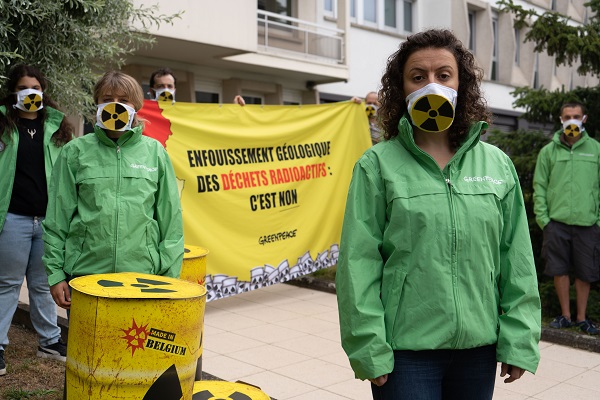 Credit: Sara Poza
Credit: Sara Poza
On Wednesday morning, Greenpeace Luxembourg activists held a protest in front of the Belgian Embassy against the disposal of nuclear waste at the Luxembourg border.
The activists demanded concrete measures for the abandonment of nuclear energy production and against the landfill project proposed by ONDRAF (the national body for radioactive waste and enriched fissile materials). This action follows the launch of the cross-border public consultation on the geological disposal of Belgian radioactive waste in the midst of the current health crisis.
Outside the embassy, six activists displayed a banner with the words "Enfouissement géologique des déchets radioactifs : c'est non" (no to the geological burial of radioactive waste) and symbolically piled up nuclear waste drums.
The protest followed Luxembourg's Environment Minister Carole Dieschbourg's announcement last month that the Belgian authorities were planning to dispose of its radioactive waste underground at the Luxembourg border. Greenpeace has maintained that ONDRAF / NIRAS presents this project on the geological disposal of high-level and long-lived radioactive waste without objectively proposing the possible alternatives. The NGO also claimed that there is a lack of information on the feasibility and safety of the proposed geological disposal, as well as on the long-term costs and the environmental impact (including the cross-border impact) of such a project. Greenpeace expressed its concerns in a joint opinion of the National Action Committee against Nuclear Ppwer.
Roger Spautz, Greenpeace Nuclear Campaign Manager, insisted: “The burial of radioactive waste is a dangerous solution. At such a depth, it is impossible to manage a leak of radioactive material. If the Belgian project materialises, an accident of this type could contaminate the Luxembourg water tables and the consequences for our country would be unmanageable".
Furthermore, Greenpeace has denounced the fact that a possible geological storage site would not be fully operational before 2100. By then, nuclear waste must be stored safely and a "temporary" alternative must be developed as early as possible. According to Roger Spautz, “it is important to develop a solid, transparent and participatory process to achieve this. There is an urgent need to carry out a thorough and independent evaluation of this research work and to discuss the priorities and corresponding budgets for the coming years in order to minimise the burden of this waste for future generations. Currently, dry storage, on the surface or subsurface, is the "least bad" solution. The fact that practically all the countries that produce nuclear waste continue to stockpile it rather indicates that there are practically no alternatives for this hazardous waste".
The environmental organisation has called on the Luxembourg government to take action against Belgium's project for the geological disposal of radioactive waste near the Luxembourg border and against extending the life of its reactors.








